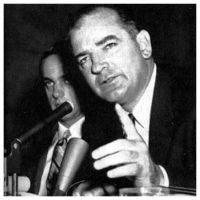Being a bit burned out by the elections and nefarious Bushie plots, I searched for something else to write about and found an interview in Salon of the ever-dreary Amy Sullivan. Amy is once again lecturing us that white evangelicals might vote for Democrats if only Democrats could learn to talk about abortion correctly.
I don’t like the [pro-choice] label. I guess the reason I wrote about abortion the way I did in the book is because I have serious moral concerns about abortion, but I don’t believe that it should be illegal. And that puts me in the vast majority of Americans. But unfortunately, there’s no label for us.
If you don’t believe abortion should be illegal, the standard label for you is “pro-choice.” And wouldn’t it be nice if someone who gets as much attention on the abortion issue as Amy Sullivan actually had a bleeping clue what she was talking about.
~~~~~~~~~~~~~
Also at Salon, former evangelical John Marks predicts that more white evangelicals will be voting for Democrats in the future, anyway. Marks told interviewer Louis Bayard,
When George W. Bush came along, there were a number of issues — gay marriage, repeal of sodomy laws, the Ten Commandments on the courthouse — all those issues allowed activists to go to pastors and say, “Look, this is coming right into your own backyard. These new laws are going to change your world, and they’re going to lay the groundwork for the America your children will inherit. So either you vote or you let the country go and you lose your place it.”
It was a moment of both political awakening and political naiveté. Because all of a sudden there was a sense of power that the evangelists could have as one bloc. But then they began to look at what they got for their vote, and they began to look more closely at the policies of the president that they had rallied behind.
The war didn’t turn out well, and that had been seen, in some quarters, as an ordained venture. People said, “If we’re really going to look at the Bible and Jesus as a model for our political involvement, what are we talking about? Christ never talks about homosexuality and talks a great deal about poverty. What about that?” Rick Warren, the most influential evangelist in America right now, is talking about AIDS in Africa. That has to do with a whole different part of the teachings of Christ.
We’ll see.
~~~~~~~~~~~~~
I want to give a shout out to my brother About.com Guide Austin Cline, who covers the agnosticism/atheism beat. He has an article up on “Barack Obama’s Religious Beliefs & Background” that I think, praised be, is accurate and unbiased. Wow.
~~~~~~~~~~~~~
Yesterday the Pew Forum on Religion and Public Life released a survey that said nearly half of American adults leave the “faith tradition” they were raised in to either join another religion or drop out of organized religion altogether.
Some of this is old news. The old “mainline” Protestant congregations continue to shrink, while the membership of non-denominational churches and the ranks of the unaffiliated continue to grow.
This is new: The unaffiliated — people who say they are religious but don’t claim allegiance to any particular institution or tradition — are now the fourth largest religious group in America.
Also, from the report:
Groups that have experienced a net loss from changes in affiliation include Baptists (net loss of 3.7 percentage points) and Methodists (2.1 percentage points). However, the group that has experienced the greatest net loss by far is the Catholic Church. Overall, 31.4% of U.S. adults say that they were raised Catholic. Today, however, only 23.9% of adults identify with the Catholic Church, a net loss of 7.5 percentage points.
However, the number of Catholics in America remains fairly steady, mostly because of Latino immigration.
Neela Banerjee writes in the New York Times:
Prof. Stephen Prothero, chairman of the religion department at Boston University, said large numbers of Americans leaving organized religion and large numbers still embracing the fervor of evangelical Christianity pointed to the same desires.
“The trend is towards more personal religion, and evangelicals offer that,” Professor Prothero said, explaining that evangelical churches tailored much of their activities to youths.
“Those losing out are offering impersonal religion,” he said, “and those winning are offering a smaller scale: mega-churches succeed not because they are mega but because they have smaller ministries inside.”
I’m not sure what Prothero says about smaller ministries makes sense, but I agree with what he says about “impersonal” religion. Someow just getting dressed up on Sunday morning and going to church just to hear a sermon and sing a couple of hymns ain’t workin’ for people.
But I think there are other factors. The time crunch experienced by two-income families with children might make “going to church” just one more burdensome thing on an already full plate. The breakup of communities possibly makes church attendance seem less compulsive. After years of televangelism, maybe people just expect church services to pack more of an emotional wallop, or at least be entertaining.
What Pew says about Buddhism is discussed on the other blog.

 This is too funny. At the hilariously misnamed Accuracy In Media (AIM),
This is too funny. At the hilariously misnamed Accuracy In Media (AIM),